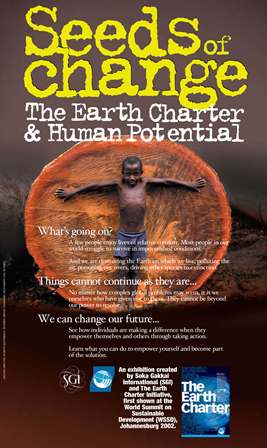
The opening reception for “Seeds of Change,” a Buddhist exhibit that advocates education, personal empowerment and local initiatives to resolve global environmental problems, will be held on Sunday, April 7, at SUNY Fredonia’s Reed Library.
SUNY Fredonia President Virginia Horvath will open the 2 p.m. reception planned at the library’s Japanese Garden Room. Both the reception and exhibit, occurring at the start of the campus observance of Earth Week, are free and open to the public.
The exhibit’s 16 colorful panels feature the works of environmental activists, such as Wangari Maathai, whose Green Belt Movement to reforest parts of Kenya began as a small nursery in her backyard. Maathai’s determination to raise and plant saplings in her area evolved into a global initiative that has inspired hundreds of local women’s groups to plant over 20 million trees in deforested areas of the world.
As “Seeds of Change” notes, Maathai has said that “sometimes when we think of global problems, we get disempowered. But when we take action at the local level, we are empowered.” Individuals can encourage the larger goals of the UNESCO Earth Charter initiative, which include joining together to bring forth a sustainable global society founded on respect for nature, universal human rights, economic justice and a culture of peace.
“Seeds of Change,” which first appeared at the World Summit on Sustainable Development in Johannesburg, South Africa, in 2002, has had regional appearances at the University of Rochester and Cornell University.
“We are very lucky to have the exhibit in Fredonia because its availability just coincided with our local observance of Earth Week,” said Dr. John Arnold, history professor and event organizer. “Its message coincides with basic Buddhist principles of the interconnectedness of life as well as a mindfulness of our actions and their impact on the environment and those around us.”
Through “Seeds of Change,” Soka Gakkai International-USA, part of a lay Buddhist association with 12 million members in nearly 200 countries and territories dedicated to promoting peace, engages in community outreach and promotes interfaith dialogue on environmental issues. More information on the two organizations is available at www.sgi-usa.org.
Support for the exhibit, which will remain open through April 21, has been provided by the Department of History, Environmental Studies and Religious Studies.



